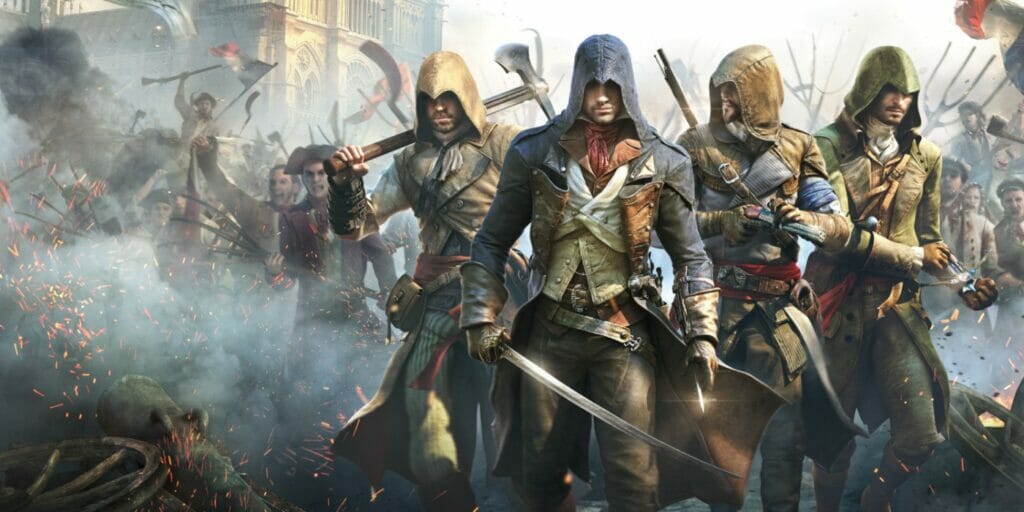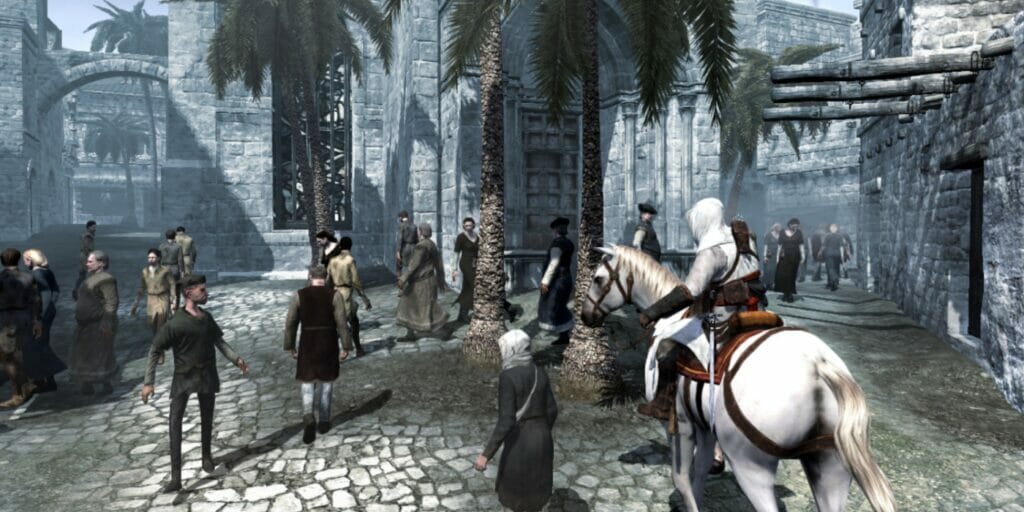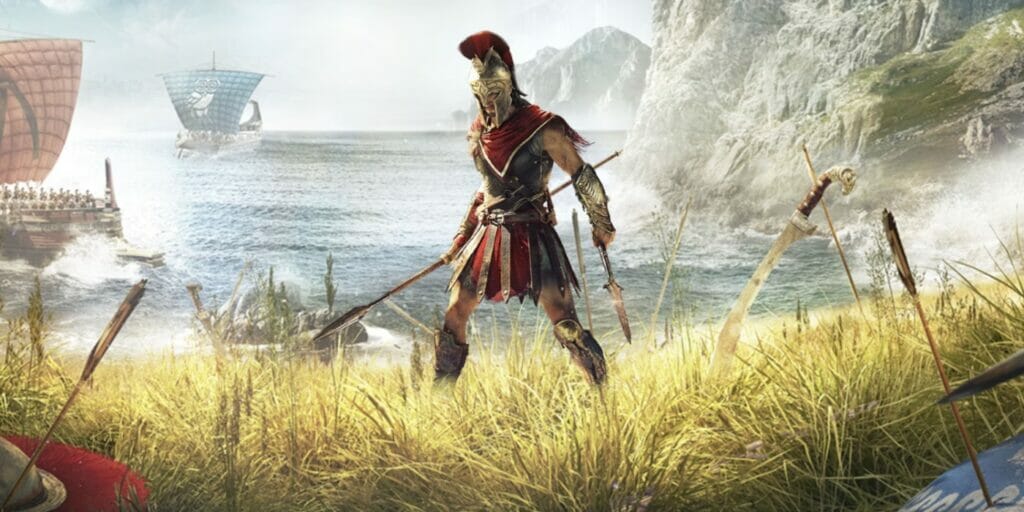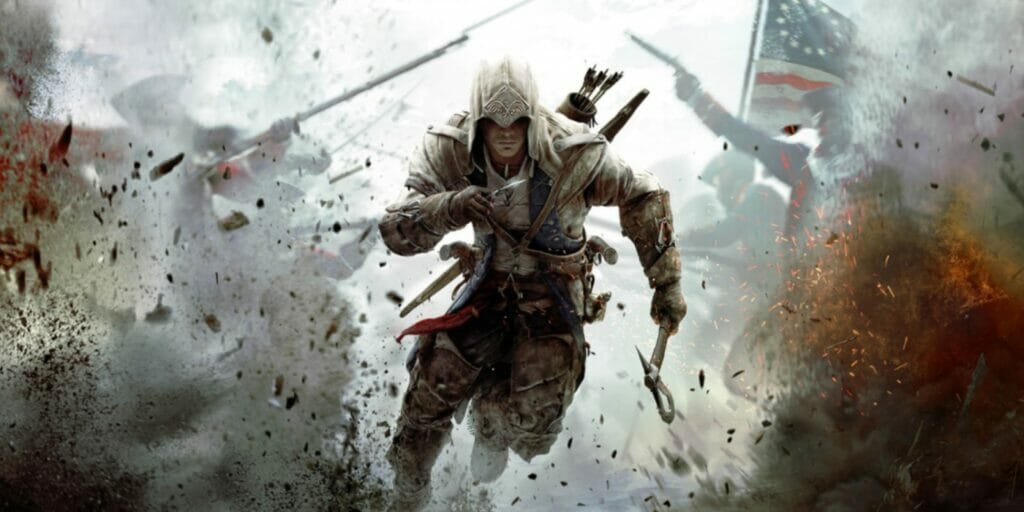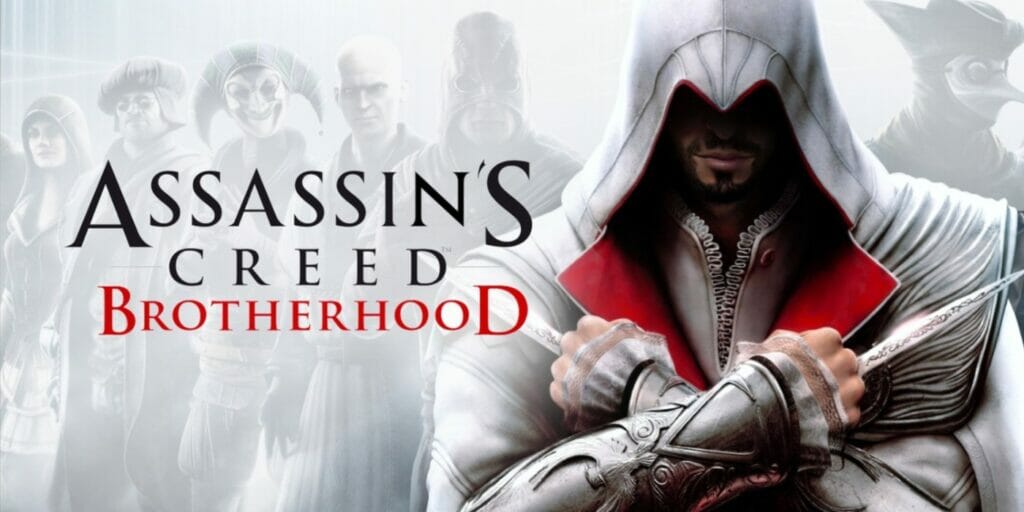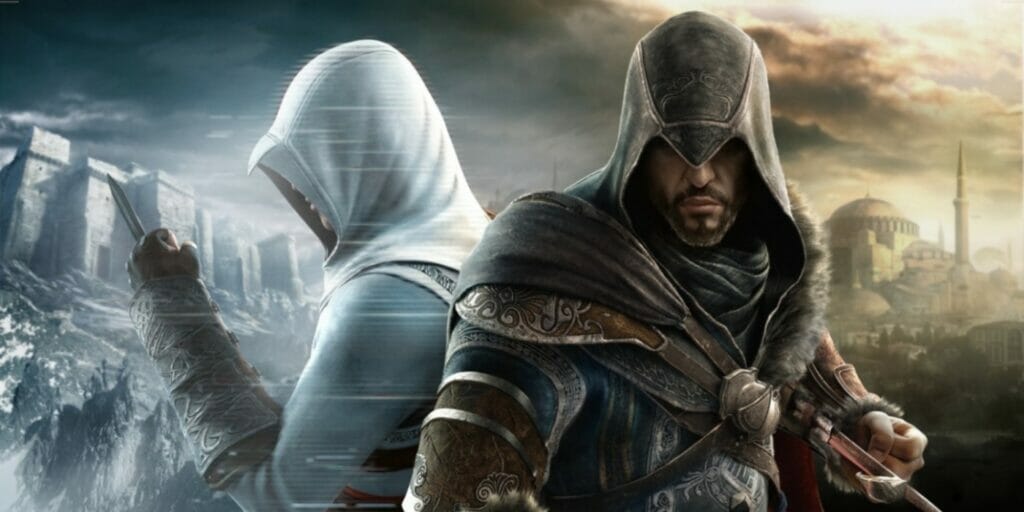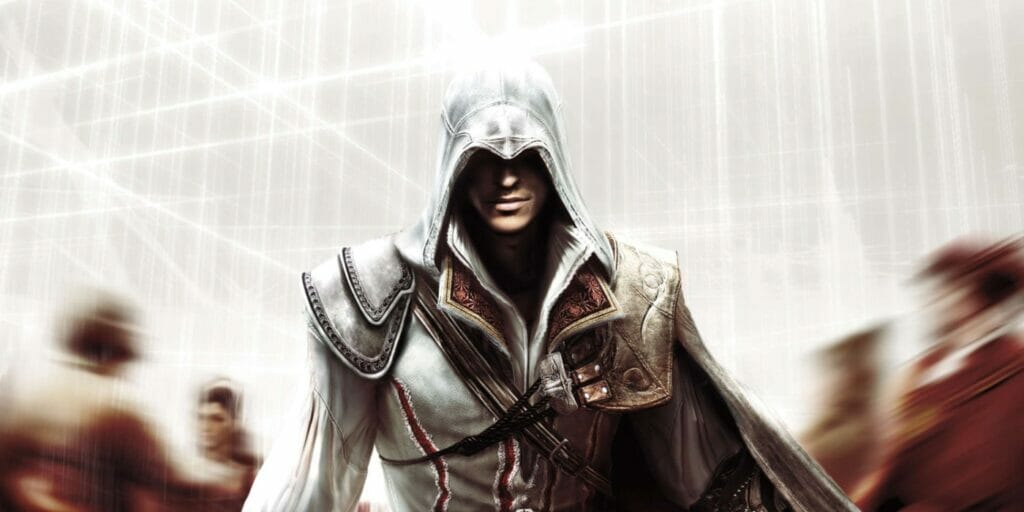Skip To...
Assassin’s Creed is one of the most prolific and longest-running game franchises of the 21st century. Since the first game debuted in 2007, it’s been nearly impossible to avoid this series as it has effectively dominated conversations across the gaming industry every time a new title drops. The series has undergone a number of transformations throughout its run, and that can make it difficult to compare all of the different titles next to each other. For this ranking, the focus will be squarely on the main series Assassin’s Creed games, and not the plethora of side content the game has gotten on handheld and mobile systems throughout the years.
13. Assassin’s Creed Unity
The fifth game in the series became instantly notorious upon release due to the intense number of bugs present in the game at the time. In 2014, the idea of a game being patched into a more complete state after launch hadn’t yet been cemented, so the outrage over Assassin’s Creed Unity was something more unique in the period, and the result was a much longer period of resentment than what is the norm for games released in similar states today. There are fans who defend the current state of the game, but it should still lose some points for being an early adopter of one of the industry’s worst modern trends.
12. Assassin’s Creed Syndicate
Assassin’s Creed Syndicate undoubtedly benefits from its captivating Victorian-era London setting, but it lacks much of the depth seen in other entries. The dual-protagonist dynamic, though promising, doesn’t fully explore its potential. There’s not much here to make it stand out among its peer releases and a slew of technical issues upon release bogged down the experience to sour the mood of many at the time. With its rough launch in the past, however, many are much quicker to sing its brighter notes in the present day.
11. Assassin’s Creed Valhalla
Assassin’s Creed Valhalla remains one of the most divisive entries in the series to date which makes it feel like the most daunting to definitely place anywhere. It’s equal parts a return to form with the game circling back to many of the stealth mechanics that were ditched in previous entries while simultaneously delving into a lot of new mechanics. Those new mechanics combined with a setting not before explored by the series certainly set Assassin’s Creed Valhalla apart from almost everything else. When the ship starts to gain water is when considering whether or not Valhalla does any of these new things it’s trying particularly well. For some, it swims, and for others, it sinks to the stony cold bottom.
10. Assassin’s Creed
The title that started it all suffers from many of the same problems that many first games do in long-running franchises. Assassin’s Creed is admirable for what it introduced, its eye for historical fantasy, and for still having some replayable qualities even all these years later. Ultimately, though, it pales in comparison to its successors, and time has dated many of its features.
9. Assassin’s Creed Odyssey
Assassin’s Creed Odyssey is, admittedly, one of the best-looking games in the series, but still ranks closer to the bottom due to its failure to feel much like an AC game at all. The game leans heavily into RPG elements, diluting the stealth and assassination aspects that have defined the franchise thus far. This is an issue not necessarily unique to this game, but rather a general trend many of the games in the series suffered from at this time, but this is certainly the title that came up feeling the most unfamiliar as a result. The focus on microtransactions and grinding for progression also detracts from the overall experience, making it a divisive entry among longtime fans of the series.
8. Assassin’s Creed 3
At a time when many felt like the Assassin’s Creed series could do no wrong, the third (but actually fifth) main series game was hotly discussed by gamers around the world for its many divisive creative decisions. On the one hand, Assassin’s Creed 3 makes brilliant use of its colonial-age American setting, with the 18th-century depictions of cities like Boston being beautiful and a blast to explore. On the other hand, the game suffers for many in the narrative department, with Connor failing to meet the expectations set by past assassins like Ezio and Altair.
7. Assassin’s Creed Rogue
Assassin’s Creed Rogue is worthy of recognition largely for its unique perspective shift, which offers players a chance to see the Templar’s side. After so many games in the franchise not touching much on Templars outside of them being the “big, bad guys” it’s very refreshing to have some development put into this imposing group. Aside from that, it largely revisits familiar gameplay mechanics from previous titles, treading water in a way that would make it nothing special if it wasn’t for its thoughtful story approach. The reception from the fanbase is largely that Assassin’s Creed Rogue is a game that will make most players just want to pick up Black Flag.
6. Assassin’s Creed Mirage
The portrayal of an ancient Baghdad and the fantastic lore surrounding it in Assassin’s Creed Mirage is captivating. It stumbles a little where it soars, in being a game that circles back to where the series came from, making it feel like a return to form as much as it feels a little derivative, but it successfully balances the familiar Assassin’s Creed formula with a spectacular setting, making it a worthy addition to the franchise.
5. Assassin’s Creed Origins
Assassin’s Creed Origins revitalized the franchise at a time when many players considered the standard approach that was being released yearly a bit stale. It has an immersive Egyptian open world with breathtaking visuals and a compelling origin story for the Assassins faction. The shift towards RPG elements, side quests, and refined combat breathed new life into the series, even if some of these elements were later abandoned due to the series ceasing to feel like itself. Regardless, this game brought a lot of new ideas to the series and is worthy of a deal of respect as a result.
4. Assassin’s Creed Brotherhood
In many ways, Assassin’s Creed Brotherhood feels like a refinement of Assassin’s Creed 2. It continues the story of Ezio and brings in some interesting elements, like the series first attempt at multiplayer. It does these things admirably, and really only falters in not being quite as important as the higher titles on this list.
3. Assassin’s Creed Revelations
Assassin’s Creed Revelations brings together the game’s first protagonist Altair with the fan-favorite second protagonist Ezio for a game that puts a beautiful bow on the story of both characters. This game spells the end of an era, one that some fans feel the series hasn’t fully recovered from, and it’s not difficult to see why. Some of Assassin’s Creed Revelation can be viewed as treading water, but for many, it’s the series bringing all of its best pieces from the past together.
2. Assassin’s Creed 2
Assassin’s Creed 2 maintains itself as one of the best games both in its series and in Ubisoft’s catalog even 14 years after its release. Ezio remains one of the best protagonists and assassins largely in part due to the fantastic story of this game. Pair that with Assassin’s Creed 2 expanding the combat and stealth mechanics, introducing a lot of what’s considered staple to the series today, and the experience presented here is something that little else can match.
1. Assassin’s Creed 4: Black Flag
For many diehards, Assassin’s Creed 4: Black Flag continues to stand alone as the pinnacle of the series. It does this by maintaining all of the best elements of the series, from its stealth and sword-swinging combat combined with a captivating historical fantasy story, and the game further adds a number of new innovations to make Black Flag feel like nothing else before or after it in the franchise. From the ship combat to its tropically perilous Caribbean setting, it remains an unmatched entry.


